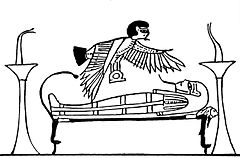Free soul
As a free core (free soul ) denotes the religious studies and anthropology (Ethnology) the presentation of a core, which is also independent of the biological body may exist. Depending on the teaching, it already existed or not before the creation of the body, and survives its death as a soul or shadow . In parapsychology there is the related concept of the “excursion soul” (from Latin excursio “foray”), which can leave your body temporarily while it is still alive, while it is in a trance , fainting or sleep .
Concepts
Concepts about the soul can be found in many mythologies and religions around the world. Some assume that the soul already exists before the body ( pre-existence of an immortal soul), others assume that the soul arises at the same time as the body or is created by a deity . With death, the soul finally separates from the body and from then on leads an independent existence as a dead soul, where it either dwells in a realm of the dead on the other side or stays among people as a “spirit”. Through its immortality, the soul enables the individual to continue to exist.
There were ideas of life after death , for example, in the Mesopotamian religions , in ancient Egypt ( Ka and Ba ) and in ancient Greece ( underworld , Hades). They are still common today among many ethnic groups and indigenous peoples . The idea of rebirth ( reincarnation ) is also based on a soul that can inhabit different bodies one after the other (“transmigration of souls”), for example in the Indian religions Hinduism and Jainism and in Buddhism (see rebirth in Buddhism ).
The concept of the “excursion soul” describes the idea that the soul can temporarily leave his body during a person's lifetime without causing his death, for example in sleep or dream (“dream soul”), in a state of ecstasy or powerlessness, or consciously experienced as an out-of-body experience , such as a near-death experience .
In contrast to the free soul, a “body soul” or “vital soul” is inseparably bound to the body; it arises and dies with him and in principle cannot leave him. It regulates the physical functions of a person (or an animal). Depending on the religion, a person can have both a body soul and one or even several free souls.
Soul in Christianity

While Judaism did not yet have a concept of an immortal soul that could be detached from the body, Christianity adopted this concept from Hellenistic traditions, especially Platonism .
The fact that the human soul already existed before his body was represented in early Christianity in the pre-existence doctrine of the Platonic church father Origen , which, however , was condemned as heresy in the 6th century . The church teaches, based on explanations about the creatianism of the church father Lactantius , that the soul of every person is created by God at the moment of his conception . The soul created during conception nevertheless survives the death of the body.
The doctrine of the ultimate things is the subject of the eschatology of Christianity . There are death , judgment , heaven and hell . The teaching of the Roman Catholic Church knows purgatory , in which souls, with the exception of those who go straight to heaven, experience a purification before they are taken into heaven.
See also
- Eternal life
- “Alter Ego” in ethnology
- Soul journey
- Shamanic soul journeys
- Soul sleep
- Breathing soul
- The mind-body problem
literature
- Hans-Peter Hasenfratz : Soul I: 2. Soul, types and characteristics of spiritual epiphanies. In: Theological Real Encyclopedia . Volume 30. De Gruyter, Berlin / New York 1999, ISBN 3-11-016243-1 , p. 734 ff.
Individual evidence
- ↑ Annette Zgoll : The oikomorphic man: essence in man and the essence of man in Sumerian-Akkadian perspective. In: Bernd Janowski (Ed.): The whole human being: To the anthropology of antiquity and its European post-history. Akademie, Berlin 2012, ISBN 978-3-05-005113-0 , pp. 83-108, here p. 95 ( page preview in Google book search).
- ↑ a b Hans-Peter Hasenfratz : Soul I: 2. Soul, types and characteristics of spiritual epiphanies. In: Theological Real Encyclopedia . Volume 30. De Gruyter, Berlin / New York 1999, ISBN 3-11-016243-1 , p. 734.
- ↑ Hans-Peter Hasenfratz: Religious studies for the soul conception. Using the example of ancient Egypt. In: Johann Figl , Hans-Dieter Klein (ed.): The concept of the soul in religious studies. Königshausen & Neumann, Würzburg 2002, ISBN 3-8260-2377-3 , pp. 121–130, here pp. 121–122 ( page previews in the Google book search).
- ↑ Markus F. Peschl : The role of the soul in cognitive science and neuroscience: in search of the substrate of the soul . Königshausen & Neumann, 2005, ISBN 978-3-8260-2909-7 , pp. 28 ( Page preview in Google Book Search).
